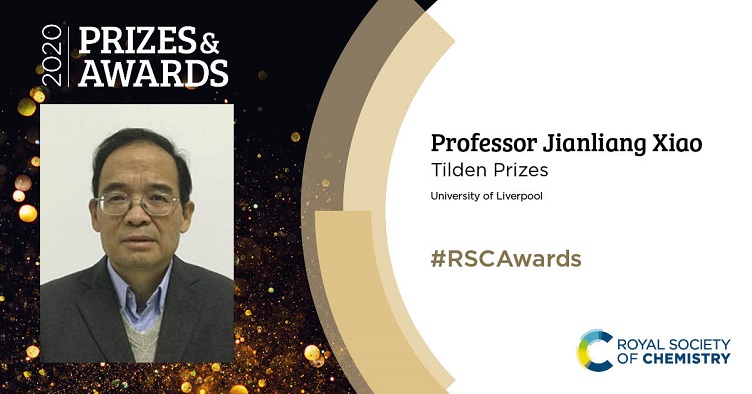Professor Jianliang Xiao awarded prestigious Royal Society of Chemistry Prize
Published on

University of Liverpool Professor of Catalysis, Jianliang Xiao, has been named the winner of the Royal Society of Chemistry’s Tilden Prize.
The Tilden Prize, founded in 1939, commemorates Sir William Augustus Tilden, British chemist and pioneer in the teaching of science.
Professor Xiao won the award for outstanding contributions to catalysis, both in fundamental studies and commercial application.
On receiving the award, Professor Xiao said: “I am truly delighted and very honoured to be awarded the Tilden Prize. I thank my students and colleagues for their contributions, it is that which makes my work in molecular catalysis and this award possible.”
Professor Xiao also receives a medal and £5,000 prize money.
Professor Xiao’s work is mainly concerned with developing molecular metal catalysts and understanding the mechanism of their action, in the hope to contribute to greener, more economic organic synthesis.
In 2014, Professor Xiao founded the company LCC (Liverpool ChiroChem) in conjunction with two of your former PhD students and a PDRA, Dr Jianjun Wu, Dr Paul Colbon, and Dr Jiwu Ruan.
Dr Helen Pain, acting chief executive of the Royal Society of Chemistry said:
“We live in an era of tremendous global challenges, with the need for science recognised now more so than ever – so it is important to recognise those behind the scenes who are making significant contributions towards improving the world we live in. It is our honour and privilege to do that with these awards, which recognise exceptional scientific achievement.
“The global chemical sciences community is one that covers many different specialisms, from health and climate change to product development, sustainable transport, and everything in between. In recognising the work of Professor Xiao, we are also recognising the important contribution this incredible network of scientists makes to improving our lives every day.”
The Royal Society of Chemistry’s Prizes and Awards are awarded in recognition of originality and impact of research, or for each winner’s contribution to the chemical sciences industry or education. They also acknowledge the importance of teamwork across the chemical sciences, as well as the abilities of individuals to develop successful collaborations.
Of those to have won a Royal Society of Chemistry Award, an illustrious list of 50 have gone on to win Nobel Prizes for their pioneering work, including 2016 Nobel laureates Jean-Pierre Sauvage, Fraser Stoddart and Ben Feringa.